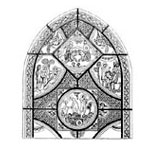
The Extraordinary Ordinariate
The last time we checked in on the happenings in the Anglican Communion was on the eve of the Church of England’s quinquennial General Synod in mid-July (“City of Confusion — Part II,” New Oxford Note, Jul.-Aug. 2010). Up for debate was draft legislation that would approve the consecration of women bishops. (Women bishops have already been installed in the Episcopal Church, the American wing of the Anglican Communion, which is seen in many quarters as a rogue church.) We wrote: “The liberalizers are again preparing for victory, sixteen years after the first woman was ordained a priest.”
Sure enough, the legislation passed the debate phase, though not without contention. Anglican traditionalists, especially of the Anglo-Catholic stripe, fought for the inclusion of legislative safeguards that would provide them with male bishops to work alongside women bishops or with separate dioceses altogether led by male bishops who do not ordain women. Their requests, however, were shot down in flames on the synod floor.
The liberalizers argued that such measures would undermine the authority of women bishops. A compromise addendum was instead tacked on that requires female bishops to delegate some episcopal duties to a male bishop where this has been requested by a traditional parish. Many traditionalists, however, have said that this is not enough.
The legislation has now been sent out for consideration to the Church of England’s forty-three diocesan synods. A majority of them must approve the legislation in order for it to return to the next General Synod, which convenes in 2012 (the diocesan synods are not allowed to make substantial amendments to the legislation, but may suggest changes). Presuming the legislation advances to the 2012 synod, it would then need to receive a two-thirds majority from the three voting blocks — bishops, clergy, and laity — in order to become church law. Once that is accomplished, the first women could be consecrated as bishops in 2014. That, folks, is ecclesial democracy in action.
You May Also Enjoy
Black Elk repeatedly spoke of how the Lakota ways were "connected" to Catholicism, and how the spiritual experiences of the Lakota prepared them for Christ.
Allan Greer's Mohawk Saint is a learned work by a non-Catholic intended to challenge the prevailing view of Iroquois conversion to Christianity.
Jesuit missionaries left reports on the martyrdoms of many Native American converts to Catholicism. Not one has been canonized.

